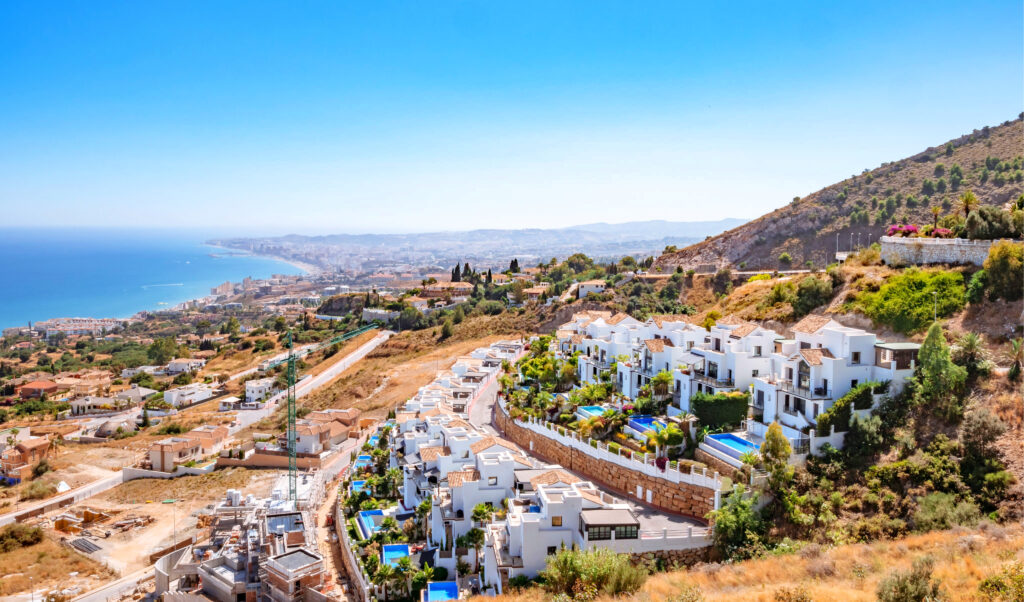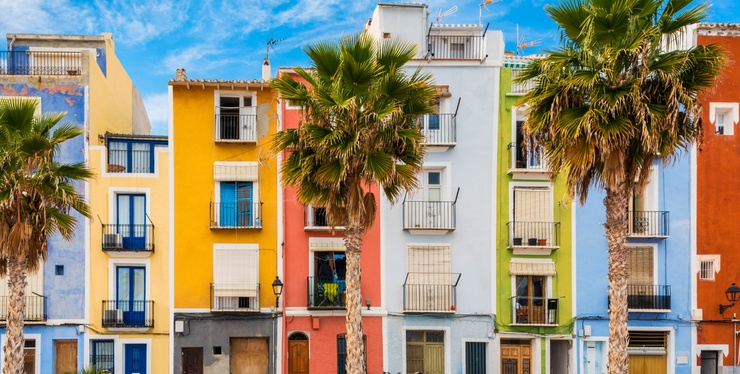Spain has long been one of the most desirable real estate markets in Europe, attracting investors, retirees, and lifestyle seekers from all over the world. With its Mediterranean climate, historic cities, and thriving tourism sector, Spain offers both financial opportunity and personal enjoyment. Whether you’re interested in a seafront villa, a modern city apartment, or a countryside retreat, real estate for sale in Spain provides a wide range of options for international buyers.
This guide explores everything you need to know — from market trends and best locations to legal considerations, financing, and smart strategies to maximize your investment.

Key Takeaways
- Spain’s property market remains one of the strongest in Europe, supported by high foreign demand.
- Top investment areas include Madrid, Barcelona, Costa del Sol, Costa Blanca, and Balearic Islands.
- The Golden Visa program attracts non-EU buyers with residency opportunities.
- Strong tourism ensures profitable rental yields in coastal and urban centers.
- Spain’s property values remain competitive compared to France and Italy, with strong appreciation potential.
Introduction to the Spanish Property Market
Spain’s property market is internationally renowned for its diversity and resilience. Following the 2008 financial crisis, the market experienced a significant correction, which created opportunities for investors. Over the past decade, property values have steadily risen, particularly in major cities and along the Mediterranean coast.
For global buyers seeking real estate for sale in Spain, the country offers both luxury and affordability. From multi-million-euro mansions in Marbella to affordable apartments in Valencia, Spain’s real estate market caters to a broad range of investors.
Why Buy Real Estate in Spain?
Spain is more than just a holiday destination — it’s a country that blends lifestyle and investment appeal.
- Lifestyle Benefits: A warm climate, Mediterranean diet, rich cultural heritage, and relaxed way of life attract retirees and second-home buyers.
- Tourism Growth: Spain consistently ranks among the world’s top tourist destinations, fueling demand for vacation rentals.
- Residency Opportunities: The Spanish Golden Visa program allows non-EU citizens to obtain residency by purchasing property worth €500,000 or more.
- Affordability and Value: Compared to France or Italy, Spain offers competitive property prices with high long-term growth potential.
Market Trends in Real Estate for Sale in Spain
The Spanish real estate market is shaped by several clear trends:
- Foreign Demand: Buyers from the UK, Germany, France, Russia, China, and the US continue to invest heavily in Spanish property.
- Urban vs Coastal Split: While Madrid and Barcelona dominate the urban markets, the Costa del Sol and Balearic Islands remain hotspots for international buyers.
- Rising Rental Demand: Tourism and a growing expat community ensure strong short- and long-term rental opportunities.
- Sustainability Focus: New developments increasingly feature eco-friendly designs to meet EU standards and global buyer expectations.
Best Locations for Property Investment in Spain
Madrid: The Capital’s Prestige and Growth
As Spain’s economic hub, Madrid offers excellent opportunities for both rental income and long-term appreciation. Properties in districts like Salamanca and Chamberí attract wealthy buyers, while affordable neighborhoods on the outskirts appeal to investors seeking value.
Barcelona: Cosmopolitan and Profitable
Barcelona combines culture, business, and tourism. Its real estate market is competitive, with strong demand for city-center apartments and coastal homes. Regulations on short-term rentals, however, require careful consideration.
Costa del Sol: Luxury and Sunshine
Stretching from Málaga to Marbella, the Costa del Sol is world-famous for its beaches, golf resorts, and international communities. Villas and apartments here command premium prices and rental income, especially during tourist seasons.
Costa Blanca: Affordable Coastal Living
Cities like Alicante and Torrevieja offer more affordable property options, making Costa Blanca a favorite among retirees and budget-conscious buyers. Rental yields are strong due to year-round tourism.
Balearic Islands: Exclusive Island Living
Mallorca, Ibiza, and Menorca are prime destinations for luxury buyers. Villas in Ibiza and seafront properties in Mallorca consistently attract high-net-worth individuals seeking exclusivity.
Valencia: Rising Star
Valencia combines affordability with lifestyle appeal. Its growing expat community and international recognition make it one of Spain’s most promising cities for real estate.
Legal Aspects of Buying Real Estate in Spain
Foreign Ownership Rules
Spain allows foreign ownership with no restrictions. Buyers only need to obtain a NIE (Número de Identificación de Extranjero), a tax identification number.
Property Purchase Process
- Reservation Agreement: Secures the property with a deposit.
- Due Diligence: Lawyers verify ownership, debts, and compliance.
- Private Contract: Sets terms and payment schedule.
- Final Deed: Signed before a notary with full payment.
Taxes and Fees
- Transfer Tax (6–10% depending on region) for resale properties
- VAT (10%) for new builds
- Notary and registry fees (~1–2%)
- Annual property tax (IBI)
Residency Options
The Golden Visa grants residency to non-EU buyers who invest at least €500,000 in real estate, covering both individuals and their families.

Financing Real Estate in Spain
Mortgage Options
Spanish banks provide mortgages to foreign buyers, usually with LTV ratios of 60–70%.
Required Documentation
- Proof of income
- Credit history
- Valid passport or ID
- Property details
Interest Rates
Interest rates in Spain remain competitive compared to other EU countries, making financing accessible to global investors.
Benefits of Buying Real Estate in Spain
- Capital Growth: Property values have risen steadily since 2014, particularly in urban and coastal regions.
- Rental Yields: Short-term rentals in tourist destinations often deliver 5–7% yields, while long-term rentals in cities average 3–5%.
- Residency Opportunities: The Golden Visa enhances mobility for non-EU investors.
- Lifestyle and Climate: Spain offers a high standard of living, excellent healthcare, and modern infrastructure.
Role of Real Estate Agents in Spain
Local Market Knowledge
Agents provide detailed insights into neighborhoods, pricing, and investment potential.
Access to Listings
Many prime properties, especially in luxury markets, are marketed privately through agents.
Legal and Administrative Guidance
Agents work alongside lawyers and notaries to ensure smooth property transactions for foreign buyers.
Smart Strategies for Buying Real Estate in Spain
- Target Tourist Hotspots: Invest in properties in Barcelona, Costa del Sol, or Ibiza for high seasonal rental yields.
- Balance Urban and Coastal Investments: Diversify between Madrid’s stability and coastal tourism-driven markets.
- Focus on Renovation Projects: Older apartments in city centers can deliver strong appreciation after refurbishment.
- Check Rental Regulations: Ensure compliance with local laws, particularly in Barcelona and Madrid, where restrictions apply.
- Engage Professionals: Always work with local agents, lawyers, and tax advisors to minimize risks.
Conclusion
Choosing to invest in real estate for sale in Spain offers buyers a chance to secure both lifestyle and financial rewards. With its strong economy, thriving tourism, and diverse property options, Spain continues to be one of Europe’s most compelling property markets.
From luxury villas in Marbella to historic apartments in Valencia, Spain provides opportunities for every budget and goal. With professional guidance and a long-term outlook, investing in Spanish real estate can be both profitable and life-enhancing.
FAQs About Real Estate for Sale in Spain
1. Can foreigners buy property in Spain?
Yes, Spain allows foreign buyers to purchase freely. The only requirement is obtaining an NIE tax identification number.
2. What are the property taxes in Spain?
Buyers pay transfer tax (6–10%), VAT (10% for new builds), and notary/registry fees (~1–2%). Annual property tax (IBI) also applies.
3. What is the Spanish Golden Visa?
It’s a residency-by-investment program for non-EU citizens who invest €500,000 or more in property.
4. Which areas are best for investment?
Madrid and Barcelona for urban stability, Costa del Sol for luxury, and Valencia for affordability and growth.
5. Are mortgages available for foreigners?
Yes, Spanish banks offer financing with LTV ratios of 60–70% for non-residents.
6. What are average rental yields in Spain?
Short-term rentals in tourist areas generate 5–7% annually, while long-term rentals average 3–5%.
7. Is property in Spain expensive?
Prime areas like Marbella and Ibiza are costly, but Spain overall remains more affordable than France or Italy.
8. Is the Spanish property market stable?
Yes, Spain has rebounded strongly since the financial crisis and continues to grow, supported by foreign investment and tourism.
9. What risks should investors consider?
Risks include fluctuating demand in tourist markets, legal complexities, and regional rental regulations.
10. Is now a good time to buy property in Spain?
Yes, with steady growth, strong rental demand, and competitive financing options, now is a favorable time to invest.
